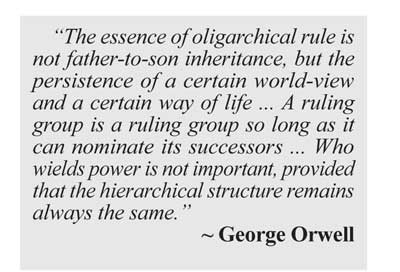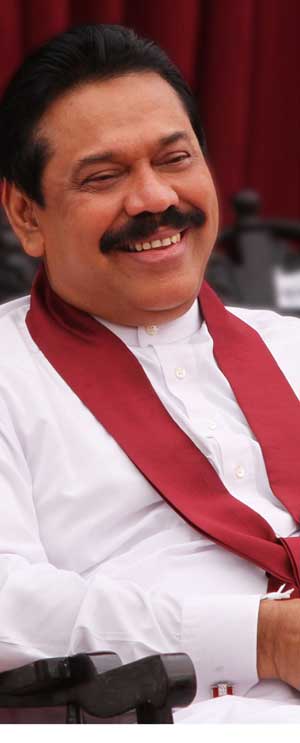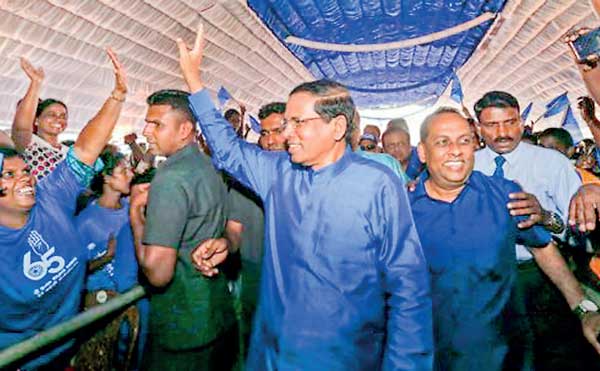Reply To:
Name - Reply Comment
Last Updated : 2024-04-27 00:00:00
 Succession of leadership of political parties is always a subject of controversy. In Sri Lanka, of all these political entities, which came into being in the early part of the 20th Century, the overall political dynamic has been that they were basically founded on either political ideology or representing a particular social class. The Ceylon National Congress, not as a political party, but as the mainstream political entity of the Legislative and State Council days, was in a sense the source of all political activity at the time. The dominance of the Ceylon National Congress in Sri Lanka’s political mosaic cannot be denied. Its preeminent role in shaping and defining the national political discourse and drafting and enacting laws and legislation to suit the individual lines of that mosaic in the period immediately preceding Independence in 1948 has been adequately chronicled.
Succession of leadership of political parties is always a subject of controversy. In Sri Lanka, of all these political entities, which came into being in the early part of the 20th Century, the overall political dynamic has been that they were basically founded on either political ideology or representing a particular social class. The Ceylon National Congress, not as a political party, but as the mainstream political entity of the Legislative and State Council days, was in a sense the source of all political activity at the time. The dominance of the Ceylon National Congress in Sri Lanka’s political mosaic cannot be denied. Its preeminent role in shaping and defining the national political discourse and drafting and enacting laws and legislation to suit the individual lines of that mosaic in the period immediately preceding Independence in 1948 has been adequately chronicled.
Yet the baton of leadership of the Ceylon National Congress, inaugurated in 1919, beginning with its founding leader Sir Ponnambalam Arunachalam, passed from one hand to the other without discrimination against any ethnicity, caste or creed. Its nucleus was the Colombo/foreign-educated elite representing all ethnic groups -- Sinhalese, Tamil, Muslim and Burgher. Its secular stance on almost all national issues was commendable and the sense of camaraderie demonstrated among its members was exemplary, at least in the first few years of its operations. The first cracks in this union of the multi-ethnic Congress appeared when Sir Ponnambalam Arunachalam resigned from the Congress in 1921. Delivering the ‘Sir Ponnambalam Arunachalam Memorial Oration’, on January 19, 2009, Dr. Brendan Goonaratne, scholar physician, said:
 “Many independent thinking people had expected that at the elections which followed in 1921, Sir Ponnambalam Arunachalam…, would be elected the Member for the Town of Colombo, while Sir James Peiris, a prominent member of the Low Country Products Association would be elected to represent that association. What in fact happened was that the Low Country Products Association elected Sir Henry de Mel to represent them, while the Town of Colombo elected Sir James Peiris (brother-in-law of Sir Henry) unopposed.
“Many independent thinking people had expected that at the elections which followed in 1921, Sir Ponnambalam Arunachalam…, would be elected the Member for the Town of Colombo, while Sir James Peiris, a prominent member of the Low Country Products Association would be elected to represent that association. What in fact happened was that the Low Country Products Association elected Sir Henry de Mel to represent them, while the Town of Colombo elected Sir James Peiris (brother-in-law of Sir Henry) unopposed.
Sir Ponnambalam Arunachalam’s untimely resignation from the Ceylon National Congress, following this election result, marks the beginning of the distrust that arose between the Sinhalese and Tamil communities thereafter, which has culminated in the horrendous ethnic war which has devastated our country in so many ways.” So occurred the maiden crack on the fabric of the first, most dominant and multi-ethnic political alliance in Sri Lanka. Democracy intertwined with party politics was a new concept for Sri Lanka. Having been a subject people of the British Monarch for nearly one-and-a-half centuries, constitutional governance and related reforms that were implemented in 1822 with The Colebrook–Cameron Commission followed up by other successive commissions, saw the Sri Lankan polity meandering towards the beginning of the 20th century, yet with no real mass representation at the helm of her leading political organizations.
This is an era in which the leftist parties were entangled in their own ideological squabbles. The cracks that surfaced in the Lanka Sama Samaja Party (LSSP), the first political party proper in Ceylon, spread into significant fissures later and gave birth to the Viplavakari Lanka Sama Samaja Party (VLSSP) led by Phillip Gunawardene and the Communist Party (CP) led by Dr. S.A. Wickremesinghe. However, these breakups of the left parties did not produce the same consequences that were generated by the first fracture in the then leading national political party, United National Party (UNP).
At a certain point of time, SWRD Bandaranaike, though the sitting Leader of the House, realized that he was not the chosen successor to DS Senanayake. In fact Bandaranaike joined the new party that was formed by DS Senanayake without dissolving his original organization Sinhala Maha Sabha. As per Kumari Jayewardene’s critical analysis of the emergence of the Sri Lankan elites during the evening of the British Raj, Nobodies to Somebodies, the nobodies of the 19th and 20th centuries beat the somebodies of a bygone era. While the Bandaranaikes inherited and represented the low-country Sinhalese aristocracy, the Senanayakes, Kotalawelas and Jayewardenes and the rest were essentially the products of the new mercantilist class gradually progressing into a capitalist class in Sri Lanka. While the Senanayakes came from the traditional Sinhalese-Buddhists, but Colombo or overseas-educated Jayewardenes represented the Colombo or overseas-educated professional class.
A quintessential representative of the somebodies at the time, Bandaranaike, who once was determined to be superior before he became equal to the products of the new-rich low-country Sinhalese, lost the first round to the so-called nobodies. Bandaranaike’s superior debating and oratorical skills reverberated the corridors of the State Council while his rhetoric, according to the historian Professor K.M. de Silva, was matched only by G.G. Ponnambalam inside the governing houses in Sri Lanka. Moreover, the succession of leadership from father to son, DS to Dudley, in the governing party, UNP, closed the door for Bandaranaike and his leaving the UNP and forming the SLFP was justified by this uncanny foresight. Bandaranaike, as most politicians, knew that in the ultimate analysis, politics is pursuit of power and he was most proficient in ascertaining its brutal truth.
However, SWRD Bandaranaike who founded the SLFP was far from making it a family party. During his leadership, which was relatively short -- from 1951 to 1959 -- he did not allow any of his family members to meddle with the workings of the government or the party. That was remarkable. What is even more remarkable is that, a political party that opened the doors to the so-called common man closed the door to its logical successor after Bandaranaike’s death -- C P de Silva -- because he hailed from a non-Govigama caste. That indeed was a tragedy of national consequences. The veneer of family rule became attached to the common man’s party after its leadership passed hands from Bandaranaike to his widow. The family bandyism that was openly practiced by its new leaders and silently observed and countenanced by the grassroots and other party stalwarts in fact gave birth to a new party although it remained to be called the SLFP. The serfdom-mindset that prevailed during the heyday of the Bandaranaikes (SWRD’s father’s ancestors) found a new home and the refuge it provided to this servile psychosis paved the way for the Rajapaksas to emerge as the new owners of the party of the common man.

Maithripala Sirisena is a new phenomenon. For the first time after the death of its leader, the party that was founded on his birthday, Maithripala Sirisena is offering an alternative route to the party. Does the common man realize it? I do not know. But I’m sure that the common man who is always heralded as the prime mover of the movement that SWRD gave birth to and led is in a psychological conundrum. If the SLFP is determined to continue as a family-centered political party, then the membership and the grassroots would invariably choose to do so. But the very election of Maithripala Sirisena who was the General Secretary of the SLFP, who could be classified as a genuine product of the Bandaranaike-transformation, proved beyond any shadow of doubt that, whatever the SLFP and its membership and parliamentarians decide, the country is sick of family-rule. Mahinda Rajapaksa’s appeal is to that fringe, the fringe that dwells on the threshold of family-centered power and its consequential cascading of that power to those who are close to the family. Plainly put, that is sickening and dehumanizing a noble profession which is a continuing relationship with the masses for the service of man. Any attempt to bring the Rajapaksas back to the SLFP would be a betrayal of the supreme cause of its founder.
In my next column I intend to discuss the various fissures that erupted within the UNP even though its focus might be of a totally different texture and character. Sri Lankan society, after almost five hundred years of foreign rule -- Portuguese, Dutch and British -- was right throughout her history was conditioned by the rule of a king. A mindset that was set by such a process which was adherent to a one-man rule, a modern concept of government through a multi-party system originated in modern Europe and practiced by an educated electorate may look alien at the beginning and slow and lethargic during the process. When one follows the rhetoric of the Rajapaksa-related politicians, one cannot help but discover that feeding such a mindset has tangible political consequences. Their intention is to feed it and feed on it.
The writer can be contacted at vishwamithra1984@gamil.com

Add comment
Comments will be edited (grammar, spelling and slang) and authorized at the discretion of Daily Mirror online. The website also has the right not to publish selected comments.
Reply To:
Name - Reply Comment
US authorities are currently reviewing the manifest of every cargo aboard MV
On March 26, a couple arriving from Thailand was arrested with 88 live animal
According to villagers from Naula-Moragolla out of 105 families 80 can afford
Is the situation in Sri Lanka so grim that locals harbour hope that they coul